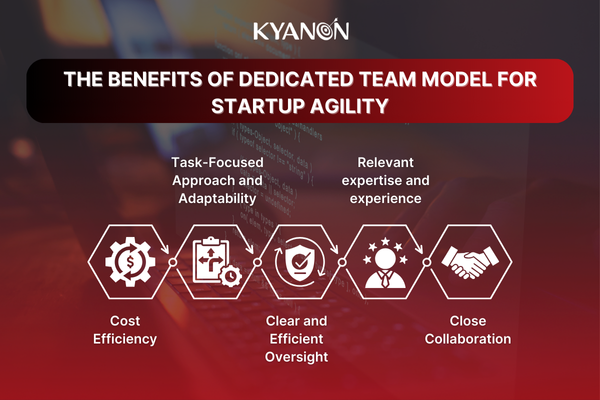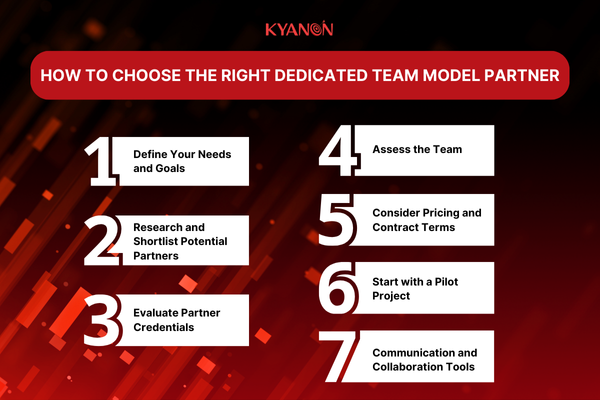Introduction
Startups are renowned for their ability to pivot swiftly in response to dynamic market demands. To maintain this agility, they must optimize resources and manage teams effectively. The dedicated team model is a revolutionary approach that provides startups with a streamlined method to guarantee flexibility and efficiency.
In this blog, we will explore the dedicated team model, highlighting its benefits and why it’s the perfect solution for startups seeking growth and adaptability.
Further reading:
- Top Countries for Software Development Outsourcing 2025
- Reliable Offshore Software Outsourcing Company In Vietnam
- In-house IT Team vs. IT Dedicated Team: Which is the Optimal Choice for Your Business?
What is the Dedicated Team Model?
The dedicated team model is an outsourcing strategy where a client’s in-house team collaborates with a remote dedicated development team. These team members are specifically selected based on the client’s project requirements and work exclusively on that project.
By partnering with a dedicated software team, clients gain access to professionals handpicked for their expertise. Administrative tasks, HR, and other overheads are handled by the outsourcing provider, allowing the client to focus on their business goals.
This collaboration model has gained immense popularity due to its numerous benefits, including scalability, flexibility, and cost efficiency.

What is the dedicated team model?
How Does the Dedicated Team Model Work?
Here’s how the dedicated development team model typically works across different stages of engagement:
- Understanding Project Requirements: The client outlines project specifications, goals, and expectations to the dedicated project team, establishing a clear foundation.
- Team Composition: A team of professionals with the required skills is assembled to meet the project’s needs.
- Integration and Communication: The dedicated software team integrates into the client’s workflow, ensuring seamless collaboration with the in-house team.
- Project Execution: The team works according to predefined milestones and provides regular updates to align with the client’s expectations.
- Scalability and Flexibility: Clients can adjust the team size or skill sets as the project evolves, ensuring adaptability to changing requirements.
- Ongoing Collaboration: Regular meetings, updates, and performance reviews ensure transparency and accountability.

Dedicated software development team
Top Reasons to Hire a Dedicated Software Development Team
To help customers make the right decision, we’ve created a checklist. If the answer is “yes” to most of the questions below, the dedicated software team model could be a viable option:
1. Do the customer’s employees have the required experience and expertise?
If not, external support may be necessary.
2. Is the project large in scope?
For large projects with multiple tasks and complex requirements, it may be difficult for internal teams to successfully complete the project alone.
3. Is the project long-term?
Dedicated teams are particularly effective for large-scale and long-term projects. If the project is urgent or there is a lack of experienced employees, a dedicated team can help accelerate the development process.
4. Does the customer need flexibility?
The dedicated team model offers flexibility, allowing the project to adapt to changes in priorities—common in fast-moving environments like startups. A dedicated team can quickly add new features or even redesign the project without compromising quality or deadlines.
5. Does the customer want control over resources?
With a dedicated team, the customer maintains full control over the project and the team managing it. This model is often more cost-efficient than hiring in-house developers, making it an ideal choice when the budget is tight.
6. Does the customer want more control over the day-to-day process?
For customers who prefer to stay closely involved in the project’s progress, dedicated project teams provide access to progress-tracking tools and daily reports to ensure transparency and keep them updated.
The Benefits of Dedicated Team Model for Startup Agility
1. Cost Efficiency
Cost efficiency is one of the most notable advantages of working with a dedicated team.
Assembling an in-house team perfectly suited for a project can be a time-consuming and expensive endeavor. This process often strains resources, including the project’s budget and timeline.
Hiring a qualified, pre-assembled, dedicated team offers a practical and cost-effective alternative. It eliminates the need for extensive recruitment efforts and reduces HR and administrative overhead. Instead of dedicating time and money to organizational tasks, resources can be redirected toward crucial areas like technology research, business analysis, and strategic planning. This approach allows you to focus more on delivering the project while maintaining high-quality standards.
Additionally, opting for a dedicated team can significantly reduce costs, particularly when the team is located in regions with lower development expenses. For instance, according to PayScale, senior software engineers in the US typically charge $64–$100 per hour, while developers in Eastern Europe charge around $25–$37 per hour. This difference provides startups with the opportunity to access top-tier talent without overextending their budget.
By choosing a dedicated team, you can achieve cost efficiency, streamline workflows, and ensure that your product’s quality remains uncompromised.
2. Task-Focused Approach and Adaptability
One of the standout advantages of a dedicated project team is its task-focused approach. This model allows for deeper immersion into the project, fostering creativity and generating diverse, innovative insights for potential solutions. This level of focus leads to more refined and effective outcomes.
Additionally, the dedicated software team offers great flexibility. The team can quickly add new features or adjust the developed software to meet evolving project requirements, ensuring faster project completion and enhanced results.
By working with a dedicated team, the client gains the advantage of heightened focus and adaptability. The team can be reconfigured at any point to accommodate changes in the project’s scope, requirements, or priorities.
External factors such as technology shifts, market demands, or budget constraints may necessitate rapid adjustments. The dedicated team model facilitates these changes with a faster development turnaround, ensuring the project remains on track.
While agile processes can also support flexibility, a dedicated team provides more opportunities for the client to address specific nuances, explore different options, and thoroughly test solutions, all while maintaining a clear focus on the project.
Ultimately, a dedicated team’s singular focus on one development project ensures that the best possible results are delivered, tailored specifically to the client’s needs.
3. Clear and Efficient Oversight
Dedicated teams utilize task management and time-tracking tools that provide the customer with real-time access to project information. This ensures seamless communication between the customer and the development team, making the management process both transparent and efficient.
Regular updates through messaging platforms and daily reports further enhance visibility and facilitate effective management.
The client has full control over the motivation, selection, and management of dedicated team members, ensuring alignment with project goals.
4. Relevant expertise and experience
Outsourcing a project to a dedicated software team means gaining access to professionals with the necessary expertise and skills. The customer works with engineers who have experience developing projects with similar functionality. These experts can identify even the smallest details that may have been overlooked and offer valuable advice.
The team already has well-established routines for task delegation and creating streamlined workflows. If the project is starting from scratch, the customer can avoid potential conflicts and challenges that may arise, ensuring a smoother development process. This is a significant benefit of working with a dedicated team.
5. Close Collaboration
Narrowing the perspective can be one of the biggest challenges in long-term projects, as maintaining a broad view requires ongoing involvement.
With a dedicated team, the customer and team members work closely together to achieve visible results and reach a common goal. They engage in daily communication, collaborate in brainstorming sessions to enhance workflows and long-term planning, and regularly assess both strengths and weaknesses in the process.
This close collaboration is crucial for addressing project challenges and swiftly resolving unexpected issues. A study found that 86% of employees cite poor collaboration as a main cause of workplace failures.
The dedicated team model fosters tight cooperation not only between the client and the team but also within the development group itself. This approach improves long-term planning and encourages team members to contribute actively, brainstorm solutions, refine workflows, and assess progress. Additionally, 97% of workers report that communication affects their daily performance.
By maintaining constant communication and collaboration, the client and team can efficiently tackle challenges, with brainstorming sessions driving tangible results and greater overall efficiency.

The benefits of dedicated team model for startup agility
How to Choose the Right Dedicated Team Model Partner
The benefits of dedicated team services are numerous, especially for startups seeking startup growth solutions. But reaping those rewards hinges on choosing the right partner. Here’s how to ensure you select the dedicated team for startups that will fuel your success:
1. Define Your Needs and Goals
- Project Scope: Clearly outline your project requirements. This includes the specific technologies needed (e.g., if you need a dedicated development team for a specific platform), deliverables, and timelines.
- Team Size and Expertise: Determine the necessary skill sets and the number of team members. Consider whether you need a full-fledged team or a smaller, more specialized agile team model.
- Budget: Establish a realistic budget for the project. This will help you narrow down potential partners who align with your financial constraints.
- Communication and Collaboration: Define your preferred channels and tools for working with your dedicated team.
2. Research and Shortlist Potential Partners
- Referrals and Recommendations: Seek recommendations from trusted sources or industry peers who have experience with dedicated team models.
- Online Platforms: Explore reputable B2B platforms like Clutch, GoodFirms, and LinkedIn to find companies specializing in providing dedicated teams for startups.
- Company Websites and Portfolios: Review potential partners’ websites, case studies, and client testimonials. Pay close attention to their experience working with startups and their understanding of startup agility.
3. Evaluate Partner Credentials
- Experience and Expertise: Assess the partner’s track record in your industry and relevant technologies. Look for partners with a proven history of success in delivering similar projects using a dedicated team model.
- Communication Skills: Evaluate their responsiveness, clarity, and ability to understand your requirements. Effective communication is crucial for successful collaboration with a dedicated team.
- Cultural Fit: Ensure compatibility in work ethics, communication styles, and values. This will foster a strong working relationship with your dedicated team.
- Security and Compliance: Verify their adherence to data security and industry regulations.
4. Assess the Team
- Technical Skills: Evaluate the team’s proficiency in required technologies and their ability to adapt to new challenges. This is especially important when building a dedicated development team.
- Problem-Solving Abilities: Gauge their critical thinking and problem-solving skills. A strong, dedicated team should be able to proactively identify and address challenges.
- Communication and Collaboration: Assess their communication skills and ability to work effectively as a team.
5. Consider Pricing and Contract Terms
- Pricing Models: Understand the pricing structure, whether it’s fixed-price, time and material, or a dedicated team model.
- Contract Terms: Review the contract carefully, including payment terms, intellectual property rights, and dispute resolution mechanisms.
6. Start with a Pilot Project
- Small-Scale Project: Begin with a smaller project to assess the partner’s capabilities and working style within the dedicated team model.
- Evaluation and Feedback: Provide regular feedback and evaluate the team’s performance before committing to a larger project.
7. Communication and Collaboration Tools
- Project Management Tools: Ensure your partner uses effective project management tools to track progress and foster collaboration. This helps keep everything on schedule and maintains transparency.
- Communication Channels: Establish clear communication channels and protocols for regular updates and feedback. This ensures that both teams stay aligned and can address issues promptly.
By carefully considering these factors, you can select a dedicated team model partner that perfectly aligns with your project needs and goals, paving the way for a successful and productive collaboration.

How to choose the right dedicated team model partner
Kyanon Digital stands out as a trusted tech partner for your dedicated software team – a tech partner, not a recruiter. Kyanon Digital can help to build your team strategically, aligning talents with your software vision and roadmap, not just job requirements. With ongoing upskilling and expert support from our Center of Excellence, your talent stays ahead of challenges and delivers results.
Moreover, Kyanon Digital’s talent ecosystem encompasses over 50,000 technology professionals:
- Internal Talent Core: 300+ professionals
- K-Fresh Program: Nurturing Future Digital Leaders from 18 Universities in Vietnam
- External Talent Network: 15,000+ premium candidates
- Partner Network: 1,000+ trusted partners
Conclusion
For startups seeking agility and scalability in a competitive market, the dedicated team model offers a transformative solution. It provides flexibility, cost-effectiveness, and access to top talent, allowing startups to focus on growth while ensuring projects are handled by skilled professionals.
If your startup is focused on agility, scalability, and faster time-to-market, it’s time to consider the benefits of the dedicated team model. Partnering with the right team can be the key to turning your vision into reality, with the speed and precision needed in today’s fast-moving business environment.
Ready to take your startup to the next level? Contact Kyanon Digital today to learn how our dedicated teams can help you achieve your goals efficiently and effectively.
Key takeaways
- Startups can use the dedicated team model to quickly scale operations, stay adaptable to shifting market demands, and shorten time to market, all while retaining flexibility.
- The dedicated development team helps startups save on recruitment, training, and infrastructure costs, offering access to global talent at a fraction of the price of hiring in-house teams.
- By outsourcing specific tasks to a dedicated project team, startups can focus on high-level priorities like innovation, market expansion, and customer acquisition, which ultimately boosts efficiency.
- Potential challenges like communication barriers and onboarding delays can be effectively managed with tools such as Slack and Trello, as well as by establishing strong feedback loops.
- Choosing the right partner means clearly defining your needs, evaluating their credentials, assessing team capabilities, and starting with a pilot project to ensure alignment. A well-chosen partner enhances the dedicated software team model’s benefits and accelerates startup growth.
FAQs
A good dedicated team model provider makes it a priority to align their team with your company’s culture, values, and communication style. This is done through tailored onboarding and regular collaborative sessions to ensure a seamless integration with your in-house team.
Absolutely. One of the biggest advantages of the dedicated team model is its flexibility. These teams are built to quickly adapt to changing project needs, helping your startup stay agile while maintaining workflow continuity and high-quality results.
To evaluate your dedicated team, focus on metrics such as project delivery timelines, task completion rates, the quality of deliverables, and team collaboration. Regular performance reviews and feedback sessions also play a key role in ensuring that everyone stays on track with your project goals.
While the dedicated team model works across a wide range of industries, it’s particularly beneficial in sectors like technology, e-commerce, fintech, and software development. These industries benefit from the model’s ability to provide specialized expertise and scale innovation quickly.
Yes, the dedicated team model is ideal for startups of any size, especially those that need scalability, cost-efficiency, and access to specialized expertise. It’s especially helpful for startups aiming to streamline operations and accelerate product launches.
References
- Insights into project scope definition best practices sourced from Adobe Business Blog “Project Scope Definition: Best Practices, Examples, and More”
- Insights into the benefits of the dedicated team model for startups sourced from Customer Service Manager article “Honing in on the Benefits of a Dedicated Team Model for Startups”
- Insights of how to improve collaboration between software teams from SurveySensum Blog

